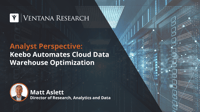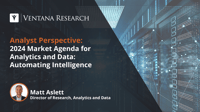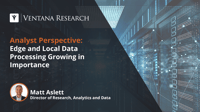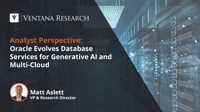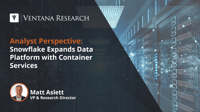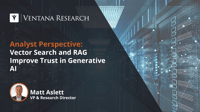I am happy to share insights gleaned from our latest Buyers Guide, an assessment of how well software providers’ offerings meet buyers’ requirements. The Data Platforms Ventana Research Buyers Guide is the distillation of a year of market and product research by ISG and Ventana Research.
Read More
Topics:
Data Platforms,
Analytics & Data,
analytic data platforms,
Operational Data Platforms
The increasing importance of intelligent operational applications driven by artificial intelligence (AI) is blurring the lines that have traditionally divided the requirements between operational and analytic data platforms. Operational data platforms have traditionally been deployed to support applications targeted at business users and decision-makers to run the business, with analytic data platforms typically supporting applications used by data and business analysts to analyze the business.
Read More
Topics:
embedded analytics,
Cloud Computing,
AI & Machine Learning,
Analytics & Data,
analytic data platforms,
Operational Data Platforms
In recent years, many enterprises have migrated data platform workloads from on-premises infrastructure to cloud environments, attracted by the promised benefits of greater agility and lower costs. The scale of cloud data platform adoption is illustrated by Ventana Research’s Data Lakes Dynamic Insights research: For two-thirds (66%) of participants, the primary data platform used for analytics is cloud based. As the quantity and importance of the data platform workloads deployed in the cloud...
Read More
Topics:
business intelligence,
Cloud Computing,
data operations,
AI & Machine Learning,
robotic automation,
Analytics & Data,
analytic data platforms
Ventana Research recently announced its 2024 Market Agenda for Analytics and Data, continuing the guidance we have offered for two decades to help enterprises derive optimal value and improve business outcomes.
Read More
Topics:
embedded analytics,
Business Intelligence,
Data Governance,
Data Management,
natural language processing,
data operations,
Process Mining,
Streaming Analytics,
AI & Machine Learning,
Analytics & Data,
Streaming Data & Events,
analytic data platforms,
Operational Data Platforms
Discussion about potential deployment locations for analytics and data workloads is often based on the assumption that, for enterprise workloads, there is a binary choice between on-premises data centers and public cloud. However, the low-latency performance or sovereignty characteristics of a significant and growing proportion of workloads make them better suited to data and analytics processing where data is generated rather than a centralized on-premises or public cloud environment. ...
Read More
Topics:
Cloud Computing,
Internet of Things,
Data,
Digital Technology,
AI & Machine Learning,
Analytics & Data,
analytic data platforms,
Operational Data Platforms
As articulated in Ventana Research’s Data Platforms Buyer’s Guide and DataOps Buyer’s Guide research, the combination of cloud computing and advanced analytics has lowered the cost of storing and processing large volumes of data, accelerating the emergence of new data platform and data operations products that enable organizations to gain operational efficiency and competitive advantage. The right combination of data platform and data management products is essential to ensure that the right...
Read More
Topics:
Data Management,
Data,
Digital Technology,
data operations,
Analytics & Data,
analytic data platforms,
Operational Data Platforms
I previously described how Oracle had positioned its database portfolio to address any and all data platform requirements. The caveat to that statement at the time was that any organization wanting to take advantage of the company’s flagship Oracle Autonomous Database could only do so using Oracle Cloud Infrastructure (OCI) cloud computing service, their own datacenter or a hybrid cloud environment. The widespread popularity of Oracle Database and the advanced automation capabilities delivered...
Read More
Topics:
Analytics,
Business Intelligence,
Cloud Computing,
Data Management,
Data,
Digital Technology,
AI & Machine Learning,
Analytics & Data,
analytic data platforms,
Operational Data Platforms
I previously wrote about the challenge facing distributed SQL database providers to avoid becoming pigeonholed as only being suitable for a niche set of requirements. Factors including performance, reliability, security and scalability provide a focal point for new vendors to differentiate from established providers and get a foot in the door with customer accounts. Expanding and retaining those accounts is not necessarily easy, however, especially as general-purpose data platform providers...
Read More
Topics:
Analytics,
Cloud Computing,
Data,
Digital Technology,
AI & Machine Learning,
Analytics & Data,
Streaming Data & Events,
analytic data platforms
I previously discussed the trust and accuracy limitations of large language models, suggesting that data and analytics vendors provide guidance about potentially inaccurate results and the risks of creating a misplaced level of trust. In the months that have followed, we are seeing some clarity from these vendors about the approaches organizations can take to increase trust and accuracy when developing applications that incorporate generative AI, including fine-tuning and prompt engineering. It...
Read More
Topics:
Analytics,
Business Intelligence,
Data,
Digital Technology,
natural language processing,
AI & Machine Learning,
Analytics & Data,
analytic data platforms,
Operational Data Platforms
I previously described how Databricks had positioned its Lakehouse Platform as the basis for data engineering, data science and data warehousing. The lakehouse design pattern provides a flexible environment for storing and processing data from multiple enterprise applications and workloads for multiple use cases. I assert that by 2025, 8 in 10 current data lake adopters will invest in data lakehouse architecture to improve the business value generated from the accumulated data.
Read More
Topics:
Analytics,
Business Intelligence,
Data Governance,
Data Management,
Data,
Digital Technology,
AI & Machine Learning,
Analytics & Data,
analytic data platforms



